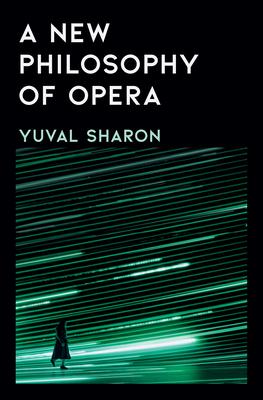Known as opera's "disrupter-in-residence," director Yuval Sharon has never adhered to the art form's conventions. In his many productions in both the United States and Europe, he constantly challenges the perception of opera as aloof by urging, among other things: performing operas in "non-places," such as parking lots; encouraging the use of amplification; and shuffling the traditional structure of classic works, like performing Puccini's La bohme in reverse order, ending not with the tubercular heroine Mimi's death but with her first falling in love.
With A New Philosophy of Opera, Sharon has crafted a radical and refreshing book that can act as an introduction to the art form for the culturally curious, or as a manifesto for his fellow artists. In an engaging style that ranges from the provocative to the personal, Sharon offers a 360-degree view of the art form, from the audience experience to the artist's process; from its socially conscious potential to its economic reality; and from its practical to its emotional and spiritual dimensions.
Surveying the role of opera in the United States and drawing on his experiences from Berlin to Los Angeles, Sharon lays out his vision for an "anti-elite opera" that celebrates the imagination and challenges the status quo. With an illustrated and unconventional history of the art form (not following a straight line but tracing a fantastical "time-curve") weaving throughout the book, Sharon resists the notion of the opera as "dying" and instead portrays it as a glorious chaos constantly being reborn and reshaped.
With its advocacy of opera as an "enchanted space" and its revolutionary message, A New Philosophy of Opera is itself a work of art--a living book with profound philosophical implications--that will stand the test of time.

Known as opera's "disrupter-in-residence," director Yuval Sharon has never adhered to the art form's conventions. In his many productions in both the United States and Europe, he constantly challenges the perception of opera as aloof by urging, among other things: performing operas in "non-places," such as parking lots; encouraging the use of amplification; and shuffling the traditional structure of classic works, like performing Puccini's La bohme in reverse order, ending not with the tubercular heroine Mimi's death but with her first falling in love.
With A New Philosophy of Opera, Sharon has crafted a radical and refreshing book that can act as an introduction to the art form for the culturally curious, or as a manifesto for his fellow artists. In an engaging style that ranges from the provocative to the personal, Sharon offers a 360-degree view of the art form, from the audience experience to the artist's process; from its socially conscious potential to its economic reality; and from its practical to its emotional and spiritual dimensions.
Surveying the role of opera in the United States and drawing on his experiences from Berlin to Los Angeles, Sharon lays out his vision for an "anti-elite opera" that celebrates the imagination and challenges the status quo. With an illustrated and unconventional history of the art form (not following a straight line but tracing a fantastical "time-curve") weaving throughout the book, Sharon resists the notion of the opera as "dying" and instead portrays it as a glorious chaos constantly being reborn and reshaped.
With its advocacy of opera as an "enchanted space" and its revolutionary message, A New Philosophy of Opera is itself a work of art--a living book with profound philosophical implications--that will stand the test of time.